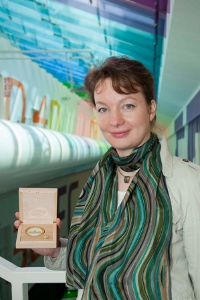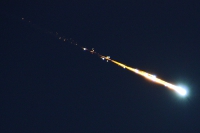ESA International Research Fellow awarded gold medal by the Russian Academy of Sciences
20 May 2010
Dr. Maria Gritsevich, an International Research Fellow in the Research & Scientific Support Department of ESA at ESTEC in the Netherlands, has received a gold medal from the Russian Academy of Sciences. The medal, granted to the best young scientist of the past year in the field of Problems of mechanical engineering, mechanics and control processes, recognises the extensive work accomplished by Gritsevich during her PhD studies at the Lomonosov Moscow State University. |
| Dr. Maria Gritsevich with her gold medal from the Russian Academy of Sciences. Credit: ESA |
Maria Gritsevich's research focuses on meteors, in particular, the events involving a meteoroid which enters the Earth's atmosphere and is subsequently decelerated. A large body of photographic evidence for these events has been accumulated over the years, tracking these fireballs and the trails they leave in the sky. During her doctoral studies, she developed new methods to estimate the dynamical parameters of these events from these pictures. Among the properties that can be derived are: the mass of the meteoroid, both before it impacted the atmosphere and when it reached the ground, its rate of deceleration, and the efficiency with which the surface is eroded - its ablation efficiency. Her work takes into account the full dynamical properties of meteors, including their height, velocity, and rate of deceleration. This represents a dramatic improvement over previous techniques, which were based on the brightness of the meteor alone and made use of a poorly-quantified relation between that and the change in meteoroid mass as it burns up in the atmosphere.
Gritsevich completed her PhD in physics and mathematics under the supervision of Professor V. P. Stulov in the Department of Aeromechanics and Gas Dynamics of the Faculty of Mechanics and Mathematics at the Lomonosov Moscow State University (MSU). She defended her thesis on 19 March 2009 at the Institute of Mathematical Modelling of the Russian Academy of Sciences (RAS).
| The Gold Medal of the Russian Academy of Sciences. Credit: ESA |
On 16 February 2010, Gritsevich was selected as one of 19 young scientists across a number of basic research fields covering natural, technical, and humanitarian science from Russian research institutions to receive the prestigious medal. She was awarded the prize on 28 April, during a ceremony held at the Presidium of the RAS in Moscow. "It is an honour to have been nominated for this award so soon after completing my PhD, and I feel very lucky to have been selected from about 1000 people nominated from all over Russia," she comments.
The award was granted to Gritsevich on the basis of her remarkable work, published in several articles in prestigious Russian journals such as Doklady Akademii Nauk, the Proceedings of the RAS. The general approach developed by Gritsevich yields a better understanding of the rich observational data collected over the years by networks of professional and amateur scientists dedicated to the observations of meteors. The application of her method to estimate the terminal mass for a number of recorded events is in good agreement with the mass of the recovered meteorites.
Thanks to this method, it is possible to analyse data provided by images of meteor events that have been recorded, and to predict the consequences of the impact, for example, to extract information about the size of the meteorites that may have survived the journey through Earth’s atmosphere. "The study of collected meteorites, especially of those with a known orbit, is a 'cheap' way to probe cosmic matter deposited on planets," explains Gritsevich, "and it complements results of future sample-return missions that could bring back pristine samples of the material."
 |
|
| Maria Gritsevich has developed new methods to estimate the dynamical parameters of meteors, such as those shown above. Left: meteors observed during a Perseid observing campaign (credit: ESA); right: a fireball photographed in the sky over the Netherlands (image courtesy of Robert Mikaelyan.) | |
Maria Gritsevich is currently an International Research Fellow jointly in ESA's Meteor Research Group and MSU, and her research work is primarily on the correct interpretation of meteor luminosity, in order to try to estimate the number of meteors detected by a camera of a given sensitivity. This work has applications in ESA's Space Situational Awareness Preparatory Programme and in the more general framework of better characterisation of near-Earth asteroids.
Notes for editors
Selected papers in physics, mechanics and astronomy from Doklady Akademii Nauk, the Proceedings of the Russian Academy of Sciences, are available in the English translation in the journal Doklady Physics.
Contact
Maria GritsevichESA Meteor Research Group
Research and Scientific Support Department, ESTEC
Directorate of Science and Robotic Exploration
European Space Agency
Phone: +31 71 565 5188
Email: maria.gritsevich
 esa.int
esa.int


